On the ground, you might not actually notice too many obvious changes in your day-to-day practice with children. But one of the key changes introduced by the Department for Education (to be supported by Ofsted in their inspections) is the idea of reducing the amount of paperwork that practitioners produce in recording assessments and collecting data from children’s observations.
This attempt to reduce the pressures and burdens of bureaucracy has been universally welcomed by practitioners, and here at Kinderly we too wholeheartedly support the idea of spending more time with the children and less time collecting unnecessary data.
But there still remains the issue of progress and understanding a child’s learning and development. After relying so heavily on EYFS statements to monitor (or tick off) a child’s progress, how do you suddenly abandon that system but still make sure that children are learning and developing as well as they should be? And how do you ensure that parents are aware of their child’s learning and development if you’re not making regular observations?
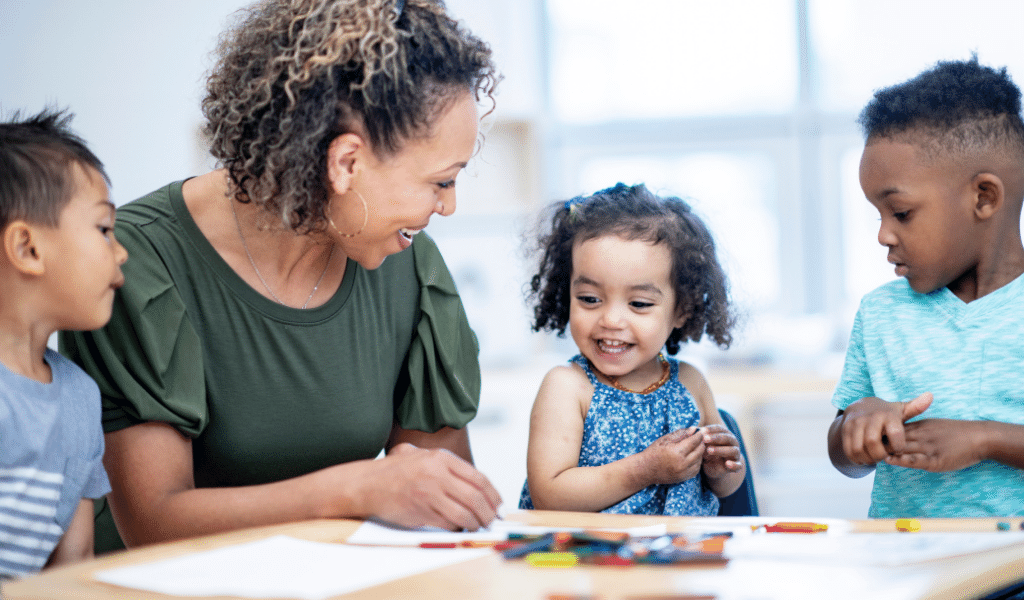
It’s very clear that you certainly shouldn’t be abandoning observations altogether. Observing the children you care for should still be a key part of your practice – as highlighted in the Birth to Five Matters guidance. They say a ‘continuously improving setting’ should:
• gather observational evidence rather than just data
• engage in regular cycles of planning and review, informed by accurate observation and record keeping focusing on children’s development and learning progress
• work in close, supportive partnership with families – sharing information to nurture the child’s wellbeing, and involving them in their child’s continuous development and learning
As highlighted on p18 of the EYFS statutory framework, there is still clearly a place for ongoing assessment:
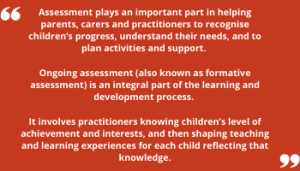
So before you stop recording everything, make sure you’re not throwing the baby out with the bathwater! Think carefully about what observations you are doing and more importantly, who benefits from them – it is about the quality rather than quantity. How are they helping you to support children’s learning and development, as part of the observation, assessment and planning cycle?
Our advice is to do what you think is right for you and your children. If recording observations and tracking assessments makes you feel more comfortable in your practice – then carry on with that! And if you feel confident in your ability to assess a child without recording loads of observations, then feel free to record just the key observations that will help you share their progress with parents.
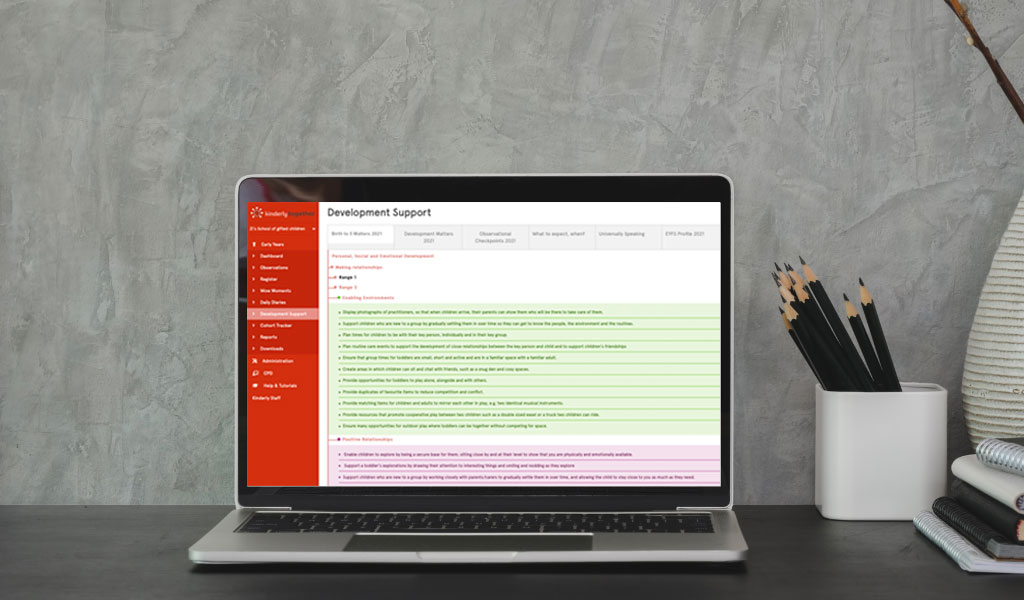
Realising that every practitioner will adapt to the revised EYFS differently has underpinned our rationale for making updates to Kinderly Together. Some of you will embrace the changes, whilst some of you might be feeling cautious and unsure. We’re here to support you all and have aimed to give you the tools you need to carry on your practice effectively from September 2021:
You’ve probably already seen the two pieces of non-statutory guidance that support implementation of the revised EYFS: Development Matters and Birth to Five Matters. You’ll find both sets of guidance on Kinderly Together from September 2021 – and it’s completely up to you which one you choose to use – or you can use both together, or neither.
In fact, our system is so flexible you can select more than one framework – you’re not just limited to using one! We’ve also added other frameworks to provide complete flexibility when you’re creating observations. In addition to Development Matters and Birth to Five Matters guidance, you can select from:
• The Revised EYFS Profile and the Early Learning Goals: Use this framework for the compulsory assessment of each child’s level of development against the early learning goals at the end of the EYFS.
• Observation Checkpoints: Use this framework to help you check a child’s development against milestones at key ages and identify any children who may not be developing typically.
• Universally Speaking: Use this framework to identify and support children to develop speech and language skills in line with their age range.
• What to Expect, When?: Although written for parents and aligning to the 2012 version of Development Matters, you can still use this framework for its great tips and advice on supporting children’s development and to share with parents.
• EYFS Development Matters 2012: And if you want to continue using the ‘old’ Development Matters framework – then this is still included within the frameworks to choose from.
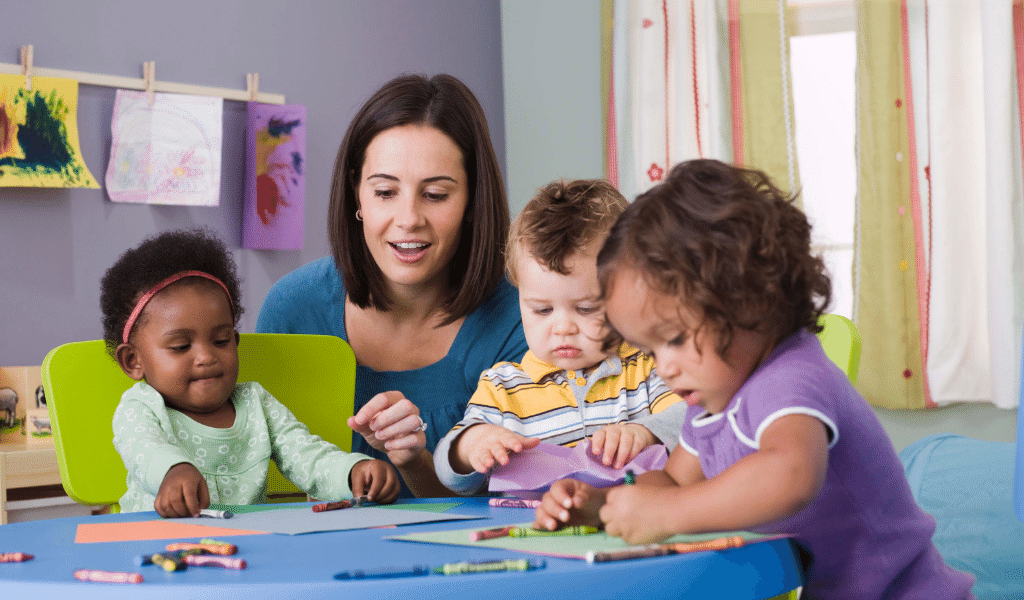
Within the previous EYFS framework, many practitioners used to use the system of creating an observation, linking it to a statement and selecting a judgement of ‘Emerging’ ‘Developing’ or ‘Secure’.
To try and move away from the ‘tick list’ culture that caused too much practitioner time being spent on paperwork and data, Kinderly Together now only asks you to think about a child’s development by the overall area or aspect of learning.
So when you record an observation, we’ll be prompting you to reflect on whether you have any concerns about the child’s level of progress in that one area or aspect of learning, and how that translates into the types of action you should be taking.
This will allow you to plan more effectively to support each child and keep an up-to-date record of how each child is progressing.
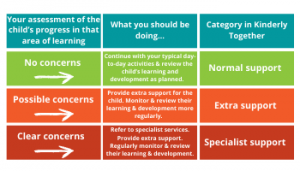
We all know how important it is to give a child the time, resources and space they need to practice and develop emerging skills. And there is so much that you as a practitioner can offer in terms of positive and supportive relationships and enabling environments.
That is why in Kinderly Together, each time you observe a child, you can now access a list of ideas, suggestions and examples that will help you enrich, deepen and extend a child’s learning and ensure they are secure in that skill before moving on to the next stage of their development.
You may not need these prompts, but if you are new to the profession or just want a refresher – then they’re a great way to ensure you’re providing as much support as possible for each individual child.
Reporting on children’s learning and development is an important part of the EYFS for a number of reasons – to share progress with parents, to identify areas where early intervention may be required and also to reflect on and improve your practice, provision and training needs.
The only progress reports that are compulsory within the revised EYFS are the 2 year progress check and the EYFS Profile at the end of the reception year. So now might be a good time to reflect on if and when you want to provide parents with additional updates on their children’s progress.
Whether you choose to report on a monthly, half-termly or termly basis – Kinderly Together has a new template that can be used at any time that makes reporting on children’s progress simple and easy to do. And of course, we still have the 2 year progress check template and the EYFS Profile framework as quick to use tools that help you meet the statutory requirements.
Whether you plan to make lots of changes to your practice as a result of the revised EYFS, or whether you are already happy with your practice and how you manage observations, we’ve redesigned Kinderly Together to be as flexible as possible for your needs.
It might take a while for us all to stop linking observations with statements and whether we should categorise a child as ‘emerging’, ‘developing’ or ‘secure’. It might take a while to start thinking about ‘stages’ rather than ‘ages’ and to feel confident in our judgements about a child’s learning and development. And of course, we will need to remain vigilant about the possibility of special educational needs and be ready to provide early support and intervention as and when it’s needed.
But we’re here to support you and would love to show you more about how Kinderly Together can support your work within the revised EYFS. Whether you’re already a member or you’d like to try out Kinderly Together, you can join us at one of our helpful demos or just sign up for a free 30-day trial and try it for yourself!